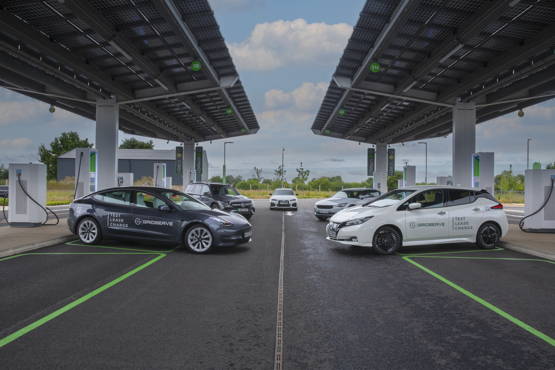
Benedikt Sobotka warns that the shortage of recycling functionality may dramatically restrict the velocity at which the EV transition takes place
Transportation at present accounts for 37% of worldwide CO2 emissions, based on the Worldwide Vitality Company, which implies the decarbonisation of the transport sector kinds an important a part of any severe plan to deal with local weather change. On the coronary heart of this course of is the transition from conventional, inner combustion engine (ICE) autos to electrical autos (EVs).
World electrical automobile gross sales have continued on a powerful upward pattern in 2022, with 2 million bought within the first quarter—a 75% enhance from the identical interval in 2021. Nonetheless, to maintain assembly this quickly rising demand, higher consideration have to be positioned on the reuse, repurposing and recycling of the batteries that energy EVs.
Present EV battery recycling market
At current, solely round 5% of lithium-ion (Li-ion) batteries are recycled globally, which is a regarding state of affairs, notably when Greenpeace predicts that over 12 million metric tonnes of Li-ion batteries are anticipated to retire by 2030. Not solely is that this an unlimited quantity of waste, however the lack of recycling functionality may dramatically restrict the velocity at which the EV transition takes place.
This drawback has been recognised and is, to a sure extent, being addressed, with a current spate of investments in recycling infrastructure and know-how. For instance, within the UK, firms alongside the availability chain reminiscent of Veolia, BritishVolt and European Metallic Recycling have all introduced main recycling tasks in 2022, which is able to collectively course of tens of hundreds of tonnes of batteries yearly. The impression of this may very well be vital for the UK; with the assistance of tasks like these, the WMG crew on the College of Warwick predicts that recycling may provide 22% of the nation’s required battery materials by 2040.
Continental Europe can also be seeing progress within the recycling sector. Simply have a look at Volkswagen, which lately introduced a battery recycling pilot in Germany that would recycle as much as 97% of the elements of a battery, or Renault, which is trying to repurpose EV batteries as vitality storage in France.
12 million metric tonnes of Li-ion batteries are anticipated to retire by 2030
Nonetheless, the recycling of Li-ion batteries nonetheless lags behind the quickly growing EV manufacturing trade, each when it comes to funding and know-how. There are a lot of causes for this, together with the financial viability of recycling batteries, the technological complexity of reprocessing diverse and quick evolving battery sorts, and logistical friction factors on account of regulatory points.
Environmental case for EV battery recycling
At the moment, one of many main points with EV batteries is their contribution to environmental degradation in landfills and areas the place they’re disposed. Among the key elements of batteries, reminiscent of copper, nickel and lead, may be extremely poisonous. Because the batteries decay, these chemical substances can leak into the encircling space, inflicting hurt to the native ecosystems.
Lead acid batteries current a danger, with one in three youngsters globally uncovered to guide poisoning on account of insufficient lead-acid battery recycling, based on a report by UNICEF and Pure Earth. The long-term hurt this will trigger if not tackled is staggering. It’s estimated that lead poisoning is accountable for a discount of around 2% of GDP in Asia and 4% in Africa because of the impression on productiveness in some communities. Enhancing the battery recycling charge to battery disposal charge ratio can cut back the dangerous impression of EVs on the surroundings—and on people.
Recycling may contribute extra broadly to the struggle in opposition to local weather change by the availability of commodities wanted to assist the vitality transition. These supplies additionally play a major position in facilitating the implementation of renewable vitality technology strategies. For instance, photo voltaic and offshore wind must and 5 instances as a lot copper respectively than conventional vitality technology strategies.

Historic underinvestment in mining tasks, coupled with the lengthy lead instances for his or her improvement, signifies that the availability of metals like cobalt and copper will wrestle to maintain up with the demand pushed by the elevated use of renewables. Recycling the used metallic from batteries can assist the manufacture of a variety of fresh vitality applied sciences and speed up motion in opposition to international warming.
Financial arguments for recycling batteries
Whereas the environmental benefits of recycling are clear, in a world the place firms and governments usually prioritise returns and profitability, it is very important additionally replicate on the financial advantages of accelerating the recycling charge of EV batteries. First off, supporting the availability of key minerals will mood metallic costs which in any other case may surge uncontrollably. In flip, this controls the worth of EVs on the level of sale, making them extra accessible to the patron and accelerating their uptake and the shift in direction of clear transport.
Nonetheless, the financial advantages are a lot wider than this. At the moment, recycling infrastructure and the recycling trade is in want of serious improvement and additional funding. The growth of the trade provide chains will create new jobs, increase financial exercise and spur progress. Actually, the worldwide lithium-ion battery market is projected to develop from US$4.6bn in 2021 to US$22.8bn by 2030, based on Markets and Markets. And whereas within the brief time period, the markets for repurposing and recycling might compete for finish of life battery volumes, in the long run, there is no such thing as a doubt: the markets are complementary. Repurposed batteries will finally require recycling.
This progress in itself can present a much-needed increase, particularly to areas reminiscent of some African international locations, the place the battery recycling trade is extraordinarily underdeveloped. However past that, whereas these international locations will profit from job creation, expertise diversification and elevated financial exercise, the repurposing of batteries can enhance their economies far more straight. Repurposed batteries can allow elevated vitality entry the place there’s a massive hole between these with entry to electrical energy, and people with out it.
Can a ‘Battery Passport’ assist?
Battery recycling will clearly be a drive for good. Nonetheless, there stay obstacles to the trade’s improvement which have to be overcome whether it is to succeed in its full potential. Differing rules signifies that there are sometimes friction factors which stop or stall the transboundary motion of lithium-ion batteries for recycling and repurposing. Moreover, as batteries evolve to turn out to be extra environment friendly, longer lasting and safer, they turn out to be extra advanced—as does recycling them.
An answer may be present in offering extra transparency and knowledge on the battery cycle and its interval of utilisation within the EV. Making this data out there to related stakeholders, governments and firms can make sure that any specific battery is appropriate for recycling, conforms to related requirements, and has the required elements to make recycling or reuse doable.
The World Battery Alliance (GBA), the biggest multi-stakeholder organisation of its variety, contains round 110 nationwide governments, trade actors, and NGOs—together with WEF, UNICEF, Eurasian Assets Group, BMW and Tesla—and is working to resolve a few of these points.
As batteries evolve to turn out to be extra environment friendly, longer lasting and safer, they turn out to be extra advanced—as does recycling them
The GBA is growing a ‘Battery Passport’, which is able to give each battery an id, performing as a digital twin of the battery to document necessary data throughout its whole lifecycle. It’s going to present end-users with key knowledge about its materials provenance, chemical make-up, manufacturing historical past, in addition to relevant ESG and lifecycle necessities, primarily based on the great definition of a sustainable battery. This technical knowledge might be collected from worth chain stakeholders together with mining firms, refiners, cell producers, module producers, battery producers, automotive OEMs and recyclers.
By setting related efficiency indicators, and monitoring and validating battery efficiency in opposition to these indicators, the GBA’s Battery Passport will subsequently create higher transparency throughout the worth chain and facilitate useful resource effectivity, life extension, secure second use and stronger battery recycling.
Extra broadly, the Battery Passport is a first-rate exemplar of an engine-room initiative that may have severe governance impression that reaches all ranges of society. From serving to safeguard these on the coalface of manufacturing, to making sure the standard of a battery hundreds of kilometres away to a shopper, the Battery Passport has the potential to the touch each facet of how we interact with the 21st century’s breakthrough electrical applied sciences.
In regards to the creator: Benedikt Sobotka is Co-Chair of the Global Battery Alliance and Chief Government of Eurasian Resources Group








